
The Irish Civil War was a conflict that followed the Irish War of Independence and accompanied the establishment of the Irish Free State, an entity independent from the United Kingdom but within the British Empire.

The Provisional Irish Republican Army, officially known as the Irish Republican Army and informally known as the Provos, was an Irish republican paramilitary force that sought to end British rule in Northern Ireland, facilitate Irish reunification and bring about an independent republic encompassing all of Ireland. It was the most active republican paramilitary group during the Troubles. It argued that the all-island Irish Republic continued to exist, and it saw itself as that state's army, the sole legitimate successor to the original IRA from the Irish War of Independence. It was designated a terrorist organisation in the United Kingdom and an unlawful organisation in the Republic of Ireland, both of whose authority it rejected.
The Real Irish Republican Army, or Real IRA (RIRA), was a dissident Irish republican paramilitary group that aimed to bring about a United Ireland. It was formed in 1997 following a split in the Provisional IRA by dissident members, who rejected the IRA's ceasefire that year. Like the Provisional IRA before it, the Real IRA saw itself as the only rightful successor to the original Irish Republican Army and styled itself as simply "the Irish Republican Army" in English or Óglaigh na hÉireann in Irish. It was an illegal organisation in the Republic of Ireland and designated a proscribed terrorist organisation in the United Kingdom and the United States.

A technical, known as a non-standard tactical vehicle (NSTV) in United States military parlance, is a light improvised fighting vehicle, typically an open-backed civilian pickup truck or four-wheel drive vehicle modified to mount SALWs and heavy weaponry, such as a machine gun, automatic grenade launcher, anti-aircraft autocannon, rotary cannon, anti-tank weapon, anti-tank gun, ATGM, mortar, multiple rocket launcher, recoilless rifle, or other support weapon, etc.
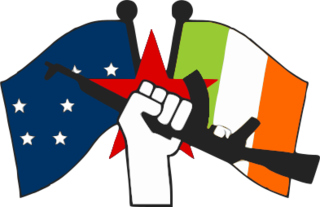
The Irish National Liberation Army is an Irish republican socialist paramilitary group formed on 8 December 1974, during the 30-year period of conflict known as "the Troubles". The group seeks to remove Northern Ireland from the United Kingdom and create a socialist republic encompassing all of Ireland. With membership estimated at 80–100 at their peak, it is the paramilitary wing of the Irish Republican Socialist Party (IRSP).
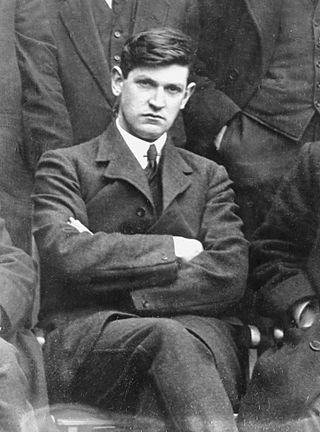
Michael Collins was an Irish revolutionary, soldier and politician who was a leading figure in the early-20th century struggle for Irish independence. During the War of Independence he was Director of Intelligence of the Irish Republican Army (IRA) and a government minister of the self-declared Irish Republic. He was then Chairman of the Provisional Government of the Irish Free State from January 1922 and commander-in-chief of the National Army from July until his death in an ambush in August 1922, during the Civil War.

The Irish Army is the land component of the Defence Forces of Ireland. The Irish Army has an active establishment of 7,520, and a reserve establishment of 3,869. Like other components of the Defence Forces, the Irish Army has struggled to maintain strength and as of April 2023 has only 6,322 active personnel, and 1,382 reserve personnel. The Irish Army is organised into two brigades.
The Independent International Commission on Decommissioning (IICD) was established to oversee the decommissioning of paramilitary weapons in Northern Ireland, as part of the peace process.

The East Tyrone Brigade of the Provisional Irish Republican Army (IRA), also known as the Tyrone/Monaghan Brigade was one of the most active republican paramilitary groups in Northern Ireland during "the Troubles". It is believed to have drawn its membership from across the eastern side of County Tyrone as well as north County Monaghan and south County Londonderry.

Roy Albert DeMeo was an American mobster in the Gambino crime family in New York City. He headed a group known as the "DeMeo crew", which consisted of approximately twenty associates involved in murder, car theft, drug dealing, prostitution and pornography. The DeMeo crew became notorious for the large number of murders they committed and for the grisly way they disposed of the bodies, which became known as "the Gemini Method". The crew is believed to be responsible for up to 200 murders, many of which were committed by DeMeo himself.

The Irish Republican Army (IRA) of 1922–1969 was a sub-group of the original pre-1922 Irish Republican Army, characterised by its opposition to the Anglo-Irish Treaty. It existed in various forms until 1969, when the IRA split again into the Provisional IRA and Official IRA.
Provisional Irish Republican Army arms importation in forms of both firearms and explosives began in the early 1970s during the Troubles. With these weapons it conducted an armed campaign against the British state in Northern Ireland.

From 1969 until 1997, the Provisional Irish Republican Army (IRA) conducted an armed paramilitary campaign primarily in Northern Ireland and England, aimed at ending British rule in Northern Ireland in order to create a united Ireland.
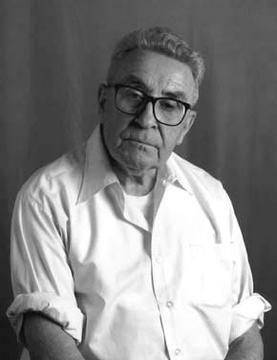
George Harrison was a primary gun runner for the Irish Republican Army and Provisional Irish Republican Army from the 1950s until 1981.

The National Army, sometimes unofficially referred to as the Free State Army or the Regulars, was the army of the Irish Free State from January 1922 until October 1924. Its role in this period was defined by its service in the Irish Civil War, in defence of the institutions established by the Anglo-Irish Treaty. Michael Collins was the army's first commander-in-chief until his death in August 1922.
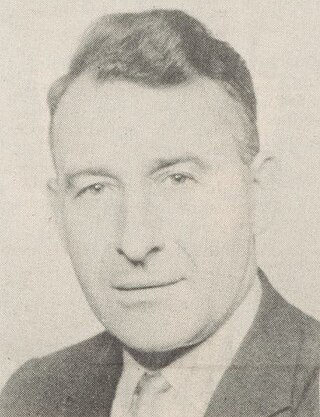
Eoin McNamee was an Irish Republican and Chief of Staff of the Irish Republican Army.
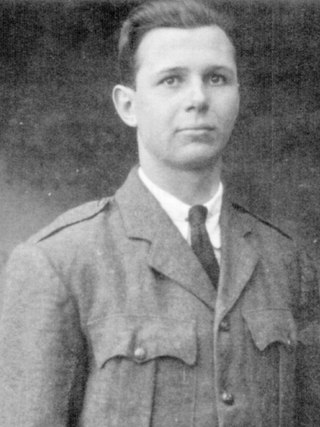
Michael Flannery was an Irish military officer and founder of the Irish Northern Aid Committee (NORAID), an Irish American membership organization that supported the Provisional IRA during the Troubles.

Ireland–Libya relations began in 1977. Ireland is accredited to Libya from its embassy in Rome, Italy after closing the embassy in Tripoli due to civil war. Libya is accredited to Ireland from its embassy in London, United Kingdom.

Throughout the protracted conflict in Northern Ireland (1960s-1998), the Provisional IRA developed a series of improvised mortars to attack British Army and Royal Ulster Constabulary (RUC) security bases. The organisation also purchased both light and heavy machine guns in order to hamper the British Army supply of border bases by helicopter. The IRA fitted vehicles, specially vans and trucks, with both types of weapons. Vans, trucks and tractors were modified to transport concealed improvised mortars to a launch area near the intended target and fire them, while light and heavy trucks were employed as firing platforms mounting machine guns, particularly M60s and DShKs. Improvised armoured vehicles and heavy equipment were also used to penetrate the perimeter of fortified security bases. The IRA vehicles were often disguised as belonging to civilian companies or even government agencies.














